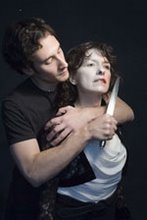"In addition to being brilliant, noble, acceptably eloquent, and all those other things we love about him, at least until the final act he’s naïve ("meet it is I set it down/That one may smile, and smile, and be a villain!"), peevish, petulant, wildly changeable from moment to moment, maddeningly and intransigently judgmental, a know-it-all theater critic, and a shallow philosopher who actually believes he can solve the eternal human problems that nobody else has succeeded at. If that’s not a teenager, what is?" Stephen F. Roth
This site makes the most comprehensive and convincing arguments, one of the most unusual and intriguing ones being:
"Only two dozen lines after the gravedigger’s thirty-year references, Hamlet conjures up some of the most haunting imagery of the scene: 'Why may not imagination trace the noble dust of Alexander…' 5.1.86 Alexander’s name is repeated like an incantation, five times in a dozen lines. And a dozen lines later, Hamlet invokes 'Imperious Caesar, dead and turn’d to clay…' 5.1.89
Consider: Alexander led his father’s armies into battle at sixteen. He became king at nineteen, following his father’s murder. And by the time he died at age thirty-one, he had conquered the known world. Caesar, likewise, was thrust into the machinations of power after his father’s death, at age sixteen, and was leading men into battle at eighteen.
Alexander’s life was common Elizabethan fare, and London theatergoers had been treated to Shakespeare’s Julius Caesar multiple times in the years preceding Hamlet’s release. The parallel between young Hamlet and those warlike young sovereigns–lodged here in the scene that so consciously and repeatedly sets times, durations, and ages–is more than suggestive. Certainly the classics-battered Oxford- and Cambridge-ites would have copped to it."



1 comment:
You've got to believe the people who work in theater on this point, and not the academics or critics.
When an playwright commits to a character's age, it's usually in the character's first scene.
The 30-year-old Hamlet info comes late in the play. Why?
An explanation came from a director who has had to work with a lot of actors. their egos and vanities.
(Not me, a famous theater director.)
This director's opinion: Richard Burbage in his 30's read a draft of the play, loved it, but passed on playing Hamlet. "I'm just too old for that. The audience would roar."
Shakespeare - being not only a genius, but REALLY REALLY SMART, knew the simple fact of theater: No star, no play. And went to work -- flattering Burbage (You look so youthful!) and went as far as adding a line, more like burying a line, late in the play, saying that Hamlet was 30, just to comfort Burbage. And Richard thought, well, why not. I get the fencing scene, the death scene - all those solos, alone on stage...
And agreed to take the part.
And the play was a hit. Still is. Probably was the right decision Burbage made.
Post a Comment